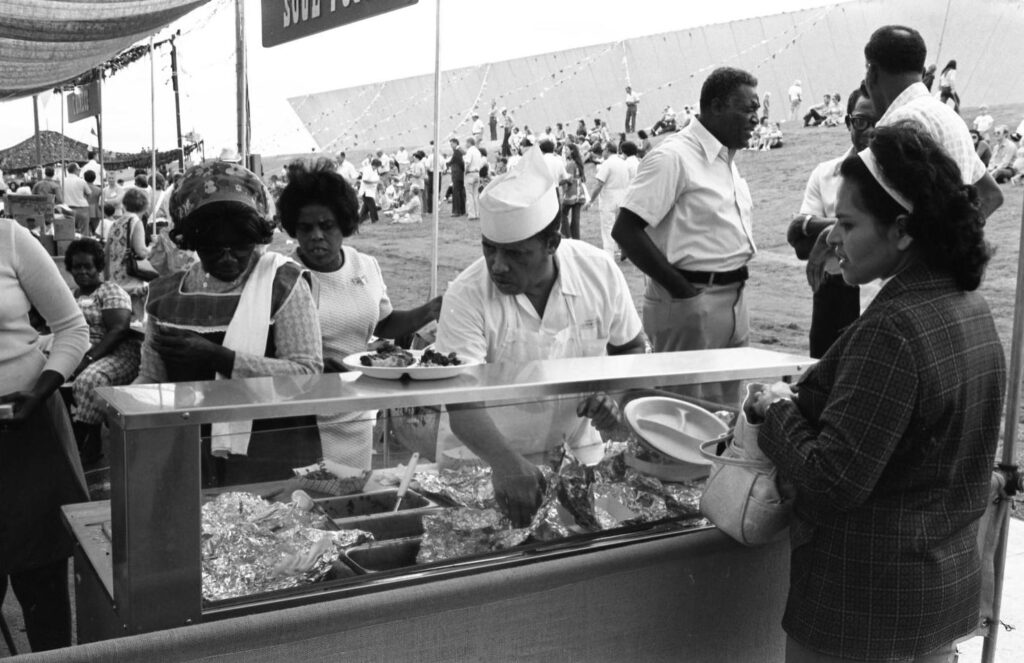For our five-question series on food and education at The Common Table, we ask experts about their strategies and practices for fostering a healthier relationship with food. Here: Scott Alves Barton, cultural anthropologist of African diasporic foodways. As an educator, his goal is to provide tools for engagement to allow people to have agency in knowledge acquisition, decision-making and autonomy about their food.
The Common Table: How would you explain your perception of food as an educational discipline or tool to someone who might think that it means just cookery lessons?
Scott Alves Barton: I define food and foodways as a relevant and necessary discipline and tool. Everything exists within food: culture, economics, politics, gender, sexual orientation, faith/spirituality, ritual, race, ethnicity, history, psychology, mathematics, chemistry, physical and social sciences, technology, Agriculture, industrialisation, robotics, hard sciences, humanities, geography, energy, agency, critical theory…

I came to Food Studies from an applied perspective, having been a working chef for 30 years. I now teach, and as a practitioner turned scholar, theory is always applied to practice in the classroom. Students can use specific cases to achieve greater cognitive understanding of theoretical precepts. As a chef, I saw where and how the food system succeeded and failed, as evidenced by labour protocols, immigrant rights, distribution systems, and international agreements.
As a chef, I saw where and how the food system succeeded and failed, as evidenced by labour protocols, immigrant rights, distribution systems, and international agreements.
The Common Table: What are you doing/have you done to change understanding related to food?
Scott Alves Barton: All of my teaching, research, writing, exhibitions/performances and public scholarship are implicitly and explicitly geared to identify, locate, critique, and express the dynamism, relevance and significance of food, foodways and Food Studies.
For several years, I taught undergraduate and graduate-level courses at New York University, as well as at public and private universities in the NYC metro area. Now I am Food Studies Professor in Africana Studies at the University of Notre Dame in Indiana. I have also participated in curriculum development on African Diaspora food and cooking and taught in culinary educational programs in NYC and at the Culinary Institute of America.
I have taught courses on Race and Inequity in the Food System, Anthropology of Food, Food History, Food and Film, Memoir and Nostalgia in Culinary Culture, Food Manufacturing in Urban Environments, Food and Film, Food Media as a Politics of Identity, Food and the City and Food and Faith.
[I work] to provide tools for engagement that will allow people to have agency in their acquisition of knowledge, decision making and autonomy about their food and foodways.
The Common Table: Who are you trying to reach and teach and why?
Scott Alves Barton: I work to reach, teach and share ideas and knowledge with my students, peers, friends and diverse publics via active listening, critical thinking, research and incisive queries to provide tools for engagement that will allow people to have agency in their acquisition of knowledge, decision making and autonomy about their food and foodways.
When we are more informed about the sources of our foodstuffs, the labour involved, the labourers who produce it, nutrition, sustainability, economics, healthy choice-making, risks and challenges, collective memory, tradition and heritage practices, we as individuals and members of social groups have a more transparent politics of identity.
The Common Table: Where would you like to take your work in this field; what are your goals?
Scott Alves Barton: I continue to work to understand, identify and share knowledge of African and African Diaspora foodways, food history, cultural norms, sacred and secular traditions, indigenous knowledge, women’s work and intergenerational teaching and learning in a way and means that is of service to more extensive, diverse and heterogeneous publics.
Some examples include The Black Farmer’s Fund, African/Americans: Making the Nation’s Table, where I was a historical consultant; ABAM, Associação Nacional das Baianas de Acarajé & Mingau [The Brazilian National Association of Black-Eyed Pea Fritter and Porridge Vendors], an NGO where I am also a consultant. Then there is the New York Botanical Garden’s African American Garden, where I am a consultant, speaker, and chef-participant and also active as a committee member for the James Beard Foundation as well as a board member for the Association for the Study of Food and Society (founded in 1985 with the goal of promoting the interdisciplinary study of food and society) and the Society for the Anthropology of Food and Nutrition.
…to take individual responsibility for one’s own well-being, as well as for the collective larger public good.
The Common Table: What is the big-picture perspective regarding the future of food education and where is it coming from?
Scott Alves Barton: In short, to take individual responsibility for one’s own well-being, as well as for the collective larger public good for the aspirational, tangible and literal goals of better nutrition, health, fitness and connection to history, culture, and continued growth of a food system that feeds local and global populations and sustains the system and the environment.
Our current realities and ways of being can be a direct threat to furthering a sustainable, equitable and productive food system and the cultures that define it unless we as a global society collectively engage in working together for the common good.
Dr Scott Alves Barton is a food historian. During his 25+ years as an executive chef, restaurant/product consultant, and culinary educator, he has taught at numerous institutions, including NYU, The New School, Pace, and the Institute for Culinary Education. He is currently Food Studies Professor in Africana Studies at the University of Notre Dame, and is a member of the James Beard Foundation Cookbook Awards committee. He was named one of the top 25 best African American chefs by Ebony Magazine.






